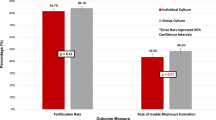Abstract
Purpose : To evaluate the effect of autologous endometrial coculture in patients (less than 36 years old) with a history of a single IVF failed cycle associated with poor quality embryos.
Methods : Design: Controlled clinical study. Setting: University-based in vitro fertilization center. Patients: Twenty-six patients with a history of a single prior failed IVF-ET with poor preembryo quality. Intervention(s): Autologous endometrial coculture. Main outcome measures: Preembryo blastomere numbers and cytoplasmic fragmentation rates were compared between the treatment and previous cycle. Clinical pregnancy rates were analyzed.
Results : Twenty-six women with an average age of 32.8 ± 2.9 years underwent treatment. On Day 3 the overall mean number of blastomeres per preembryo on coculture compared to conventional medium in a previous cycle was 6.1 ± 1.8 vs. 5.1 ± 1.3 (P = 0.01; Wilcoxon test). The average percentage of cytoplasmic fragments on coculture compared to the conventional medium in a previous cycle was 14% ± 10 vs. 22% ± 13 (P = 0.003; Wilcoxon test). At transfer the mean number of blastomeres per preembryo on coculture was 7.4 ± 1.8 compared to 6.7 ± 1.5 on conventional medium in a previous cycle (P = 0.02; Wilcoxon test). The clinical pregnancy rate (positive fetal cardiac activity) per patient was 88.5%. The delivery rate was 73.1% (19/26).
Conclusions : There was an improvement in the preembryo quality for preembryos on autologous endometrial coculture compared to noncocultured preembryos from the same patient in a previous cycle. An excellent delivery rate was subsequently found.
Similar content being viewed by others
REFERENCES
Erbach GT, Lawitts JA, Papaionnou VE, Biggers JD: Differential growth of mouse preimplantation embryo in chemically defined media. Biol Reprod 1994;50:1027–1033
Harlow GM, Quinn P: Development of mouse preimplantation embryos in vivo and in vitro. Aust J Biol Sci 1982;35:187–193
Jung T, Fischer B: Correlation between diameter and DNA or protein synthetic activity in rabbit blastocyts. Biol Reprod 1988;39:1111–1116
Telford N, Watson AJ, Schultz G: Transition from maternal to embryonic control in early mammalian development: A comparison of several species. Mol Reprod Dev 1990;26:90–100
Quinn P, Kerin JF, Warnes GM: Improved pregnancy rate in human in vitro fertilization with the use of a medium based on the composition of human tubal fluid. Fertil Steril 1985;44: 493–498
Barmat LI, Liu HC, Spandorfer SD, Xu K, Veeck L, Damario M, Rosenwaks Z: Human preembryo development on autologous endometrial coculture versus conventional medium: A randomized trial. Fertil Steril 1998;70:1109–1113
Veeck LL: Atlas of the Human Oocyte and Early Conceptus. Baltimore, MD, Williams andWilkins, 1991
Barmat LI, Liu H-C, Mele C, Xu K, Veeck L, Kowalik A, et al.: Autologous endometrial coculture in patients with repeated failures of implantation after IVF-ET. J Assist Reprod Genet 1999;16(3):121–127
Palermo GP, Cohen J, Alikani M, Adler A, Rosenwaks Z: Intracytoplasmic sperm injection:Anovel treatment for all forms of male infertility. Fertil Steril 1995;63:1231–1240
Cohen J, Alikani M, Trowbridge J, Rosenwaks Z: Implantation enhancement by selective assisted hatching using zona drilling of embryos with poor prognosis. Hum Reprod 1992;7:685–691
Fitzgerald L, DiMattina M: Improved medium for long-term culture of human embryos overcomes the in vitro developmental block and increases blastocyst formation. Fertil Steril 1992;57:641–647
Spandorfer SD, Barmat LI, Liu H-C, Mele C, Veeck L, Rosenwaks Z: Granulocyte macrophage-colony stimulating factor production by autologous endometrial co-culture is associated with outcome for IVF patients with a history of multiple implantation failures. Am J Reprod Immunol 1998;40: 377–381
Spandorfer SD, Clarke R, Bovis L, Liu H-C, Neuer A, Witkin SS, Rosenwaks Z: Interleukin-1 levels in the supernatant of conditioned media of embryos grown in autologous endometrial coculture: Correlation with embryonic development and outcome for patients with a history of multiple implantation failures after IVF. Am J Reprod Immunol 2000;43(1):6–11
Spandorfer SD, Levy D, Bagchi I, Liu H-C, Veeck L, Davis OK, Witkin SS, Rosenwaks Z: Autologous Endometrial Coculture (AECC) in Patients with IVF Failure: Correlations of Outcome with Leukemia Inhibiting Factor (LIF) and Calcitonin. In American Society of Reproductive Medicine Annual Meeting, October 1999
Thibodeaux J, Godke R: In vitro enhancement of early stage embryos with coculture. Arch Pathol Lab Med 1992;116: 364–372
Wiemer KE, Hoffman DI, Maxson WS, Eager S, Muhlenberg B, Fiore I, Cuervo M: Embryonic morphology and rate of implantation of human embryos following coculture on bovine oviductal epithelial cells. Hum Reprod 1993;8:97–101
Tucker JM, Kort HI, Toledo AA, Morton PC, Wright G, Ingargiola PE, Sweitzer CL: Effect of coculture on subsequent survival and implantation of cryopreserved human embryos. J Assist Reprod Genet 1995;12:689–692
Quinn P, Margalit R: Beneficial effects of coculture with cumulus cells on blastocyst formation in a prospective trial with supernumerary human embryos. J Assist Reprod Genet 1996;13:9–14
Sakkas D, Jaquenoud N, Leppens G, et al.: Comparison of results after in vitro fertilized human embryos are cultured in routine medium and in coculture on Vero cells: A randomized study. Fertil Steril 1994;61:521–525
Author information
Authors and Affiliations
Rights and permissions
About this article
Cite this article
Spandorfer, S.D., Barmat, L., Navarro, J. et al. Autologous Endometrial Coculture in Patients with a Previous History of Poor Quality Embryos. J Assist Reprod Genet 19, 309–312 (2002). https://doi.org/10.1023/A:1016062508127
Issue Date:
DOI: https://doi.org/10.1023/A:1016062508127




